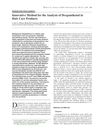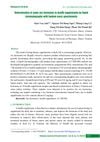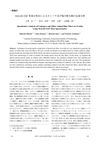 September 2024 in “International Journal of Applied Pharmaceutics”
September 2024 in “International Journal of Applied Pharmaceutics” A reliable method was developed to measure Finasteride and Tadalafil in rat blood.
 5 citations,
April 2022 in “Journal of Chromatography B”
5 citations,
April 2022 in “Journal of Chromatography B” The new method can measure sleep-related hormones in hair effectively and could help track long-term sleep patterns.
 1 citations,
March 2019 in “Journal of AOAC INTERNATIONAL”
1 citations,
March 2019 in “Journal of AOAC INTERNATIONAL” New method quickly and accurately measures dexpanthenol in hair products.
 6 citations,
April 2017 in “JAMA Dermatology”
6 citations,
April 2017 in “JAMA Dermatology” Men's hair loss is not linked to their sex hormone levels, except for lower DHEAS in those with hair loss.
 467 citations,
October 2014 in “European Journal of Endocrinology”
467 citations,
October 2014 in “European Journal of Endocrinology” The European Society of Endocrinology advises individualized long-term management for PCOS, focusing on lifestyle changes, accurate diagnosis, and treatments for associated health risks and symptoms.
 157 citations,
May 2021 in “Endocrine Reviews”
157 citations,
May 2021 in “Endocrine Reviews” Early diagnosis and individualized treatment improve outcomes for Congenital Adrenal Hyperplasia.
 71 citations,
July 2015 in “The Journal of Clinical Endocrinology and Metabolism”
71 citations,
July 2015 in “The Journal of Clinical Endocrinology and Metabolism” Women with PCOS have higher androgen levels that decrease with age but are still higher than in women without PCOS.
 10 citations,
November 2018 in “Physiological Research”
10 citations,
November 2018 in “Physiological Research” The conclusion is that standardizing testosterone measurement methods is essential for better diagnosis accuracy in women.
 5 citations,
March 2015 in “Women's Health”
5 citations,
March 2015 in “Women's Health” The document concludes that diagnosing PCOS requires a thorough approach, considering various symptoms and risks, and calls for improved methods to identify PCOS types and prevent diabetes.
 December 2023 in “Kiểm nghiệm và An toàn thực phẩm/Kiểm nghiệm và An toàn thực phẩm (online)”
December 2023 in “Kiểm nghiệm và An toàn thực phẩm/Kiểm nghiệm và An toàn thực phẩm (online)” The method detected sex hormones in some health supplements, with one containing banned testosterone.
 April 2017 in “The journal of investigative dermatology/Journal of investigative dermatology”
April 2017 in “The journal of investigative dermatology/Journal of investigative dermatology” QMSI is a valuable method for studying drug penetration in skin tissues.
18 citations,
April 2009 in “Journal of Chromatography A” Detecting steroid esters in cattle hair is inconsistent and influenced by sampling factors.
 June 2024 in “International Journal of Cosmetic Science”
June 2024 in “International Journal of Cosmetic Science” Plant oils like coconut, camellia, and safflower can penetrate hair, making it stronger and softer.
 June 2023 in “Clinica Chimica Acta”
June 2023 in “Clinica Chimica Acta” Finasteride and dutasteride effectively reduce DHT in hair, which may help evaluate their treatment success for hair loss.
 August 2023 in “International Journal of Cosmetic Science”
August 2023 in “International Journal of Cosmetic Science” Rosemary extracts, specifically compounds like rosmarinic acid and carnosic acid, can protect hair from UV damage.
 3 citations,
July 2019 in “Experimental Dermatology”
3 citations,
July 2019 in “Experimental Dermatology” Hair loss patients may have different polyamine levels in various scalp areas.
21 citations,
November 2019 in “Molecular & Cellular Proteomics” Citrullinated proteins from Porphyromonas gingivalis may contribute to rheumatoid arthritis.
7 citations,
January 2019 in “Journal of Analytical Toxicology” Tramadol and THC-COOH can be detected in hair for several months after stopping use.
 4 citations,
February 2022 in “Journal of Pharmaceutical and Biomedical Analysis”
4 citations,
February 2022 in “Journal of Pharmaceutical and Biomedical Analysis” The conclusion is that a new method can measure caffeine and drugs in hair, finding caffeine abusers have 70 times more caffeine than normal, with a proposed cut-off value for abuse.
 2 citations,
January 2012 in “Journal of The Chilean Chemical Society”
2 citations,
January 2012 in “Journal of The Chilean Chemical Society” New method accurately measures finasteride in tablets and bulk.
 21 citations,
November 2010 in “Talanta”
21 citations,
November 2010 in “Talanta” Researchers developed a reliable method to measure testosterone and epitestosterone in urine for medical and anti-doping use.
 4 citations,
January 2018 in “Forensic Science International”
4 citations,
January 2018 in “Forensic Science International” Researchers created a reliable method to detect hair-growth substances in products.
 11 citations,
August 2017 in “Journal of Chromatographic Science”
11 citations,
August 2017 in “Journal of Chromatographic Science” The new method is rapid, sensitive, and accurate for evaluating the quality of the medicinal herb Platycladi cacumen.
 1 citations,
January 2014 in “Sen'i Gakkaishi”
1 citations,
January 2014 in “Sen'i Gakkaishi” The new method reliably identifies and measures different animal hair fibers in textiles.
 June 2023 in “Journal of chemical metrology”
June 2023 in “Journal of chemical metrology” A new method found unlisted drugs in two popular hair serums, posing a health risk.
 1 citations,
March 2020 in “Functional foods in health and disease/Journal of functional foods in health & disease”
1 citations,
March 2020 in “Functional foods in health and disease/Journal of functional foods in health & disease” OM-X® helped prevent negative effects of Vitamin C deficiency in mice, suggesting it could protect organs and regulate metabolism.
 20 citations,
March 2017 in “Reproductive Biology and Endocrinology”
20 citations,
March 2017 in “Reproductive Biology and Endocrinology” Women with PCOS have higher 5α-reductase activity, which may be linked to insulin resistance.
34 citations,
January 2016 in “Analytical Chemistry” A new method can quickly and accurately detect drugs in hair.
 10 citations,
January 2019 in “Journal of Chromatography B”
10 citations,
January 2019 in “Journal of Chromatography B” Researchers developed a reliable way to measure hormones in urine, showing that a baldness treatment doesn't change hormone levels.
1 citations,
July 2021 in “Forensic science international” Both a lock of hair and a single hair strand can show chronic drug use, but at least six single hairs are needed for accurate results.

























